
Recently we sat down with ALX Community member John Lawson, who joined in October 2019 as an Unlimited Flex member (or “flexie,” as he calls it). John is the Executive Director of the Advanced Warning and Response Network Alliance (AWARN), an international coalition of TV pros in broadcasting and tech companies who are working to leverage the capabilities of “Next Generation Television,” or NextGen TV, beyond its current suite of features that includes ultra high-definition video quality and theater-like sound, right in your home. AWARN’s goal is to harness this sophisticated television technology to create a framework of best practices for a next generation emergency messaging (NGEM) system that allows for targeted messaging, which will ultimately save more lives and protect communities during natural disasters.
Read on to see how ALX Community (and Pilates!) have impacted John’s career. And if you see him around the Flex space at the Waterfront, say hello!
Tell us about your current role.
I’m president of Convergent Services, Inc. It’s a consulting firm, but we also manage an international coalition called the AWARN Alliance, which stands for the Advanced Warning and Response Network. I sort of go by two identities, so I guess my my public identity is Executive Director of the AWARN Alliance.
What was the career path that led you here?
I was involved in politics in South Carolina in the ‘80s and got recruited to Washington in 1990 for the trade association that lobbies for public television called America’s Public Television Stations. I worked there for three years, and then in 1993 I began my own business in DC. My future wife and I moved to Old Town and I started renting space through the “shared office space of the world” then, Regus. Then I went back to the trade association and was the CEO from 2001 to 2008. I then took a job in the private media, kind of chasing the money. That lasted two years, and then I started my own business again in 2010.
The term “coworking” didn’t really exist when you first worked in a shared office space in the early ’90s. What did you call it instead?
I always thought of it as “temp space,” but it wasn’t nearly as flexible as what you have today. You had to basically rent a private office, short-time or long-term. It was expensive. There was very little in terms of a common work space. There was no sense of community.
How did you discover ALX Community?
A colleague, Ron Prater. He’s like me—he’s got two identities. He’s the president of a consulting firm called Bent Ear Solutions, and he’s also the Executive Director of Big City Emergency Managers. We had cause to meet, and he invited me to meet at Founder’s Hall. So it was definitely a word-of mouth-thing, and I was immediately impressed. I liked the open space, the price was definitely right, I liked the flexibility. The ability to move between my home office and Founder’s Hall was really attractive to me.

Why were you so drawn to the flexibility?
When I ran the trade association in downtown DC, I was the head lobbyist as CEO. I learned in terms of recruiting and maintaining talent that this market was just chock-full of extremely talented women, and one of the things they really, really valued was flexibility. They wanted flexibility to be with their kids, to take care of a parent, or just to have a life. They prioritized that. The structure of a trade association is salaried employees and the typical rules you have in the employee manual. I said, “I’m going to change the rules a little bit, and we’re going to have flexibility.” And I found some terrific people. It was a lesson to me that if you treated people the way they needed to be treated, and you offered them what they demanded in the marketplace, then you’re going to get some really good people.
I was able to bring that perspective when I started my own business again in 2010. I hired a young woman to work for me, Fiona. She was a Pilates instructor, and I was so impressed that she was such a great instructor, I approached her after class and asked her to work for me. She had just had her first kid, and she said yes. She grew with the job. I could offer flexibility. And it worked for me. I’m not the most disciplined person, so having a colleague to hold me a little bit accountable was important. But I didn’t demand that someone be in the office at 8 AM, because I’m not going to be there.
Fiona left in 2019 and I began feeling pretty isolated working out of my home. That’s when I first began working out of ALX. I’d been doing my word-of-mouth thing, and again, I went to a Pilates class at Sport&Health in Old Town, and there was this great instructor who was a mental health counselor, Anya. I approached her after class, because, well, quality people know quality people. She said she was looking for some more hours, so she and I talked, and now she’s working for me. We meet at my home office or ALX.
How did the pandemic impact your business?
It impacted my business in that the core of the AWARN Alliance and my consulting business are the television broadcasters. They’re the companies that own the TV stations, and they took an immediate hit on advertising. It affected my revenue, probably cut it by a third. So that was an immediate financial impact. But, the other side of it was that I slashed my expenses by not traveling. One of my biggest line items was trade shows.
I haven’t needed to use the conference space, unfortunately, but even during the worst of the pandemic, the fact that ALX was open, you could go in with a mask—that was just a wonderful return to reality, to be able to go there, and not just be cooped up in my house.

Looking ahead, what are your goals for the rest of 2021 and into 2022?
My goal isn’t particularly monetary. What I’m really trying to do is what the AWARN Alliance is about: creating an emergency alerting system for the country. We need one. Climate change resilience is an imperative. Even if we stopped all CO2 emissions tomorrow, the global temperature would still be rising. So we need to do things to prepare. Part of it is a better system to alert people.
I can see it with the wildfires. I just read a book by a reporter with the Washington Post [Lizzie Johnson] called Paradise that’s abut the little town in California that totally burned up. At the end of 2018 they had lost 85 people. Eighty-two percent of them never received an emergency alert about the fire. There is a fixation on mobile alerting—and we do have a system for that, Amber Alerts—but I looked at the list of people who died in Paradise and they were overwhelmingly older people. They might not even have had a cell phone. You’ve got to figure out a way to reach people who are vulnerable.
What would be more important than money right now would be just some leadership from the federal government. I believe the president could get the CEOs of broadcasting and streaming and cable companies to sit at a table and agree do to this system. They have the technology. They control the infrastructure. They have a license, for free, to broadcast television. And a condition of that license is to provide public services. The only one that they have to do in terms of alerting is from the Cold War: They have to carry a message from the president of the United States in the event of a nuclear attack.
The proposition is that they’re going to use this new technology we have called Next Generation Television to do a better job of alerting. I just need to get some attention to it. People don’t want to talk about alerting. They talk about it when it fails, but I find that the press doesn’t care very much about solutions.
So I’m trying to get this thing launched. I don’t own the TV spectrum [invisible radio frequencies that wireless signals travel over], I don’t own the stations, I don’t own the technology. I’m sort of like the guy who’s getting the broadcasters to maintain the promises they made to the government, that they were going to use this new technology to do a better job of emergency alerting.
But there’s a lot more than just sending the signal. You need to craft messages that people understand. One of the things that I’ve learned is that people don’t normally panic in emergencies. They freeze. They delay. They want verification, they want more information, so number one, you have to get them the alert, and then it has to be crafted in a way that they know that it applies to them, they know the danger, they know what to do. The problem with these little wireless alerts we get is that they’re not very well geo-targeted, so people get over-alerted, and they don’t get enough information to know what to do. Like, “Here’s your house, and here’s the fire. You need to drive down this street.” That’s what they need.
Overall, how has working at ALX Community positively impacted your work, or your life outside of work?
I’ve hosted my board meetings there with people as far away as Japan coming in. They were impressed with the space, and they were impressed with Old Town.
It also helps to have a mailing address there. It creates more of a professional look to my business. Even though the corporate space was sterile, and very transactional, I also didn’t want some sort of millennial foosball table/beer hour/bean bag chair thing. Even if I were a millennial—which I’m obviously not—I don’t want that. I wanted a sense of community, but there had to be a certain business orientation to it. My Japanese board members aren’t going to sit in bean bag chairs to do a meeting.
I think ALX provides a very warm, comfortable environment. It also gives me the experience of being part of the Alexandria community. When our twins were born in 1999, we moved out of Old Town, three miles down the Parkway because we needed more space. I feel like I’ve been reintegrated into Old Town working there. It’s not just the space; it’s the people, and I think Kelly [Grant, COO/Partner] is really successfully creating a real sense of community, not just within ALX, but within the broader community. It’s in her DNA.
A good example of that is the outdoor drive-ins. Kelly got me to speak to the reporter with the Alexandria Times who wrote a piece about it. She called me up and said, “John, look, 2,000 people came but I’ve got your number right here, so would you mind talking to this reporter?” And I said something that the reporter picked up as the line from Jeff Goldblum’s character in Jurassic Park, “Life finds a way.” I may have repeated it when the reporter said it. I said, “Yeah, that’s a good way to say it, something like that.” I probably did say it, but it wasn’t my idea. Well he gives me the quote. It’s the ending quote.
And Kelly said, “I was just crying when I read that.” And I said, “Well, l’ve got a new slogan then: ‘Kelly will find a way.'” Kelly will always find a way.

This interview has been edited and condensed.
Inspired to join? Explore our various plans here!

